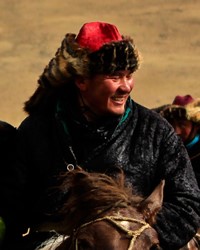Khoton in Mongolia

Photo Source:
Copyrighted © 2026
Wirestock Creators - Shutterstock All rights reserved. Used with permission |
Send Joshua Project a map of this people group.
|
| People Name: | Khoton |
| Country: | Mongolia |
| 10/40 Window: | Yes |
| Population: | 13,000 |
| World Population: | 13,000 |
| Primary Language: | Kalmyk-Oirat |
| Primary Religion: | Buddhism |
| Christian Adherents: | 4.70 % |
| Evangelicals: | 2.00 % |
| Scripture: | New Testament |
| Ministry Resources: | Yes |
| Jesus Film: | Yes |
| Audio Recordings: | Yes |
| People Cluster: | Mongolian |
| Affinity Bloc: | East Asian Peoples |
| Progress Level: |
|
Introduction / History
The Khoton are a small group of nomadic people who live in western Mongolia. Genetic studies reveal that they are of Turkish origin and not native Mongolians. The Khoton migrated to west Mongolian in the 17th and 18th centuries. During that time the Khoton lost their Turkish language and began to speak Kalmyk-Oirat tongue of their neighbors.
The Khotons tend to isolate themselves from other Mongolians. The Khoton still practice the pastoral lifestyle of their ancestors. Illiteracy is a big issue for the Khoton. Moving to different locations during the year makes obtaining a decent education for their children nearly impossible.
Where Are they Located?
The Khoton live in northwestern Mongolia in the Altaic Mountain area. A picturesque lake in west Mongolia is named for the Khoton people.
What Are Their Lives Like?
Life is hard for the Khoton on the cold, dry lands of Mongolia. The Khoton, for the most part, have resisted the efforts of the Mongolian government to settle down in villages and cities. They still roam the high valleys and plains of west Mongolia. The Khoton raise horses, yaks, cattle, sheep and goats for their meat and milk. Their favorite drink is fermented mare's milk. Their diet consists almost entirely of animal products. During the short summers, the Khoton women are able to gather some berries and roots to supplement their diets. The Khoton live in round tents called yurts. These tents can be easily taken down and moved when the Khoton need to leave an area for greener pastures.
The Khoton marry exclusively in their group. Families arrange marriages with the consent of the young people. The new brides join the groom's family. The local shaman provides primitive medical care and a link to the spirit world. Sons inherit their father's property and animals.
What Are Their Beliefs?
The Khoton's religion is a curious blend of Tibetan Buddhism, Islam and folk religion. Tibetan Buddhist practice features a number of rituals, and spiritual practices such as the use of mantras and yogic techniques. The local Khoton shaman performs rituals, which try to appease the evil spirits who will harm the Khoton and their animals if they are not honored.
There is a tiny group of believers among the Khoton. The New Testament and JESUS film have been translated into Kalmyk-Oirat. The growing church movements in Mongolia have not yet reached the Khoton.
What Are Their Needs?
The Khoton need help in educating their children. The Khoton lack access to modern medical care. Medical workers would greatly benefit them. People whose lives are based on their animals could use modern veterinarian services. Most of all, the Khoton need to hear the life-changing message of Jesus Christ in a way they can understand.
Prayer Points
Pray for a chain reaction of Khoton families reaching families that results in thousands of new believers who share their faith with others.
Pray for grace and truth expanding into the entire Khoton society as all believers learn to love others.
Pray that churches and believers will bless their entire people group in such a way that God's love will change the Khoton people like yeast changes dough.